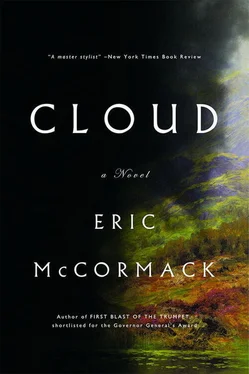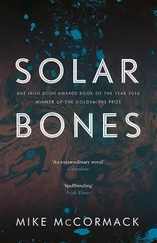he’d say.
My mother would look at me anxiously when I mentioned my bad dreams. She wouldn’t say anything, but I suspected she had her own share of nightmares.
The Tollgate was also full of superstitions. When my mother would go to wash our clothes at the communal laundry, she’d sometimes hear women from other tenements talk about such things as sightings of ghostly figures, or loud groans and banging sounds coming from empty rooms. One woman even claimed to have seen a pot of stew from her stove float through the open window and drop with a crash into the street.
“Old wives’ tales,” my father used to say, snorting and puffing, when my mother would tell us about them. It was clear he enjoyed hearing them, however, and so did I, though they too gave me nightmares. I kept quiet about that, for I didn’t want my mother’s stories to stop.
THEN, WHEN I WAS FIFTEEN, I discovered that one of these frightening things had happened in a tenement near our own. Often, on my way to school, I passed a square, paved area the size of a little garden plot, full of broken beer bottles and litter. In the middle of the square, a stone marker stuck up — it was about three feet high with a greenish bronze plaque screwed onto it. Some words were engraved on it that were hard to make out. They were covered in grime with the usual obscenities and street-gang symbols scratched over them.
One overcast November morning, I was passing the marker when no one else was around. I took out my handkerchief and quickly wiped the plaque clear enough to see the words:
IN MEMORY
OF
— CAMERON ROSS—
WHO ONCE LIVED HERE
— MAY HIS SOUL FIND REST—
On my way home from school that afternoon I called in at the public library and, after some searching, found what I was after: a heavy, worn-looking book called A Miscellany of Authentic Characters, Scenes, and Incidents from the History of Old Glasgow . It was laid out like an encyclopedia and consisted of brief entries in small print on numerous topics. One of the entries was headed “The Tollgate: The Exsanguination of Cameron Ross.”
I took the book to a reading table, opened it at the page indicated, and was immediately on my guard: right in the middle of the page, an X shape had been slashed, maybe with a razor. A dark blotch on top of the cut had seeped into the page underneath. I bent over and sniffed, just in case, but there was only the usual book smell. Under the entry-title, a warning was printed:
Readers of a delicate sensibility might do well to avoid this section.
I’d never come across that in a book before. It made me even more curious and I began reading.
Little is known about Cameron Ross’s early life except that he lived in the Tollgate, was married to a local woman, and was thirty years old at the time of the incident that made him, for a short time, infamous.
On a January morning of the Glasgow winter of 1810 his wife discovered that the side of the bed on which Ross lay was soaked in blood. Indeed, the blood was still in the process of seeping through the blankets, oozing down to the floor where it coagulated on the cold wooden planks. Ross was not asleep but lay staring up at her in silence.
A physician was called and examined Ross but could find no source for the blood on his body. He was suspicious, for he well knew about the violence in these slums. He could elicit no satisfactory answers to his questions, so he merely left a bottle of cordial for Ross.
All was well for six days. On the morning of the seventh day just before dawn Ross felt the blood again and this time awakened his wife. She lit a lamp and brought it over to the bed, and so was able to witness what happened. The blanket at his chest had turned dark and blood was welling through it. She lifted it away and saw
that the tip of something sharp, like a knitting needle, was protruding from inside his body through the flesh of Ross.
The physician was again sent for and examined Ross, but though there was much blood it had ceased to flow, and he could detect no sign of any cut, or trace of any scar. He advised that at the first premonitory sign of any recurrence of the exsanguination Ross’s wife should fetch him, so that he might see for himself the cause of the blood.
Seven days later, in the early morning, Ross’s groans alerted his wife. She went immediately for the physician and they both hurried back, arriving at the bedside no more than a half hour after the commencement of the onslaught. But Ross was dead, his eyes staring up at them. The blood was of a lesser quantity than before and there was no sign of a wound. Though Ross had been dead only a short time, his body was so cold that the sheen of blood was as brittle as wax.
The Glasgow Royal Infirmary, later that day, was requested by the physician to conduct a post-mortem on the body in hopes of discovering the cause of this strange exsanguination of Cameron Ross. The request was denied on the grounds that no useful medical purpose would be served thereby.
On the day of Ross’s burial, a large crowd such as might have attended the funeral of some dignitary followed the coffin along the streets of the Tollgate to the city Necropolis. Some claimed Ross’s death was a miraculous event. When his body was lowered into the earth at the paupers’ area, many wept.
An editorial next day in the
East Side Tribune
noted the unexpectedly large crowd of spectators at the funeral of such an obscure man as Ross and made mention of the exsanguination said to have afflicted him. The editor expressed skepticism about the reality of the illness and conjectured that Ross had deliberately wounded himself, and eventually killed himself, as a means of garnering posthumous attention. In the view of the editor, the gullible masses were ever prey to such fraudulent practices.
Ross’s wife disappeared shortly after the funeral, and it was rumoured she had drowned herself in the Clyde or found employment in a brothel. Later reports alleged that the supposedly dead Ross and his wife had recently been spotted walking together, laughing, on a street in London.
Whilst the exact site of Cameron Ross’s grave is no longer known, a plaque in his memory placed near his former home in the Tollgate may still be seen.
Sitting there in the library, the hair on the back of my neck stood up. I wondered if there was more of this kind of frightening stuff in the old book and skimmed through it, but no more warnings appeared at the tops of pages.
WHEN I LEFT the library and headed home that day, my mind was still full of the image of Cameron Ross, bleeding to death. After dinner, I must have been quieter than usual.
“Are you all right?” my mother said. She was sitting by the fire with Penny on her lap. The cat blinked at me in a friendly way. My father, in his armchair, glanced at me over the top of the newspaper, eyes narrowed against the smoke rising from his cigarette.
I knew what they were worried about now that I was fifteen. Any time I was a little late getting home from school, they thought I might be meeting a girl, that I might end up like some boys who weren’t much older than I was, marrying girls they’d got pregnant. These boys and girls were thereby condemned to live in the tenements, like their parents before them, doing the most unskilled work in the steel mills or the shipyards — if they were lucky enough to find jobs.
So, I immediately put my parents’ minds at ease. I told them I’d been at the library and was preoccupied thinking about a book I’d read there. It was about Cameron Ross, the man whose name I’d seen on a plaque down the street. They’d never heard of him, so I told them what I’d read and they listened with great interest.
I also mentioned that somebody had slashed the book, maybe with a razor.
Читать дальше











